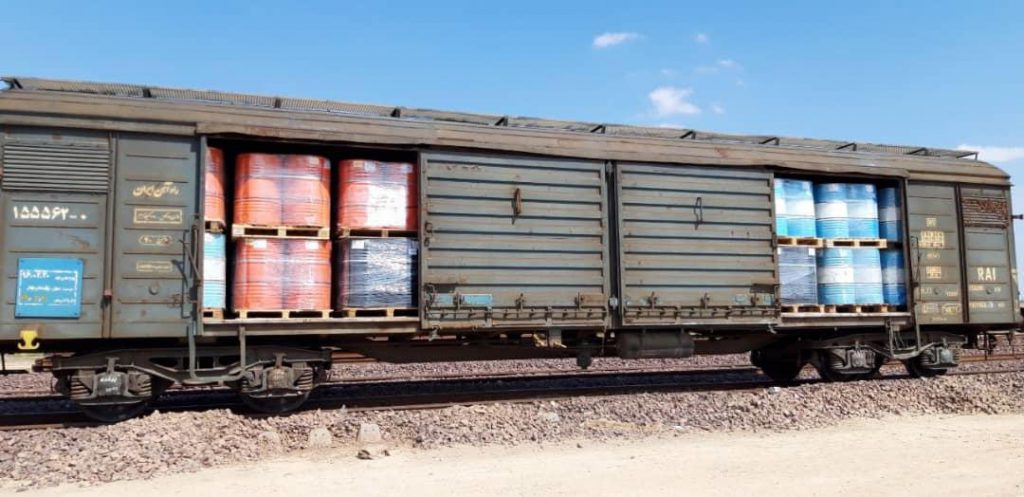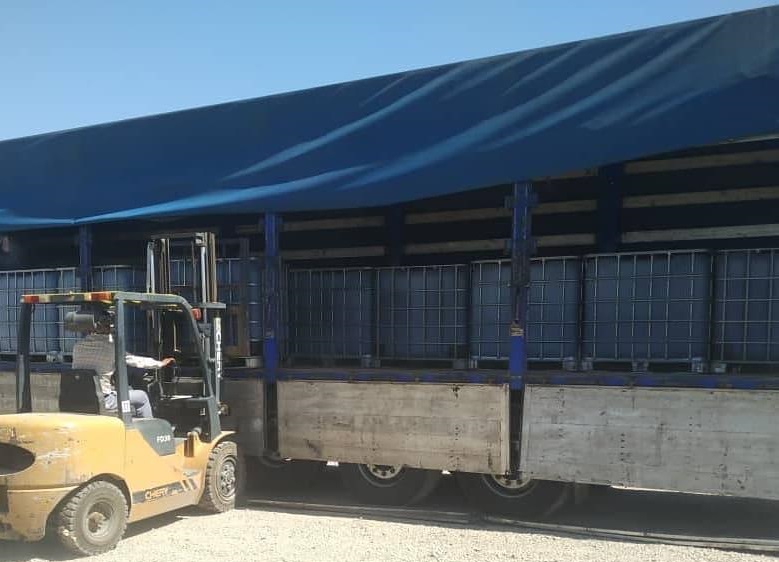Explanations about Cutback Bitumen MC800
Cutback Bitumen MC800 is a type of dissolved Bitumen. To produce this type, solvent oils such as kerosene are used in order to change bitumen into dissolved bitumen or liquid pitch, so that, during the consumption process, the solvent oil evaporates and bitumen residue to obtain the desired adhesion. In many countries, kerosene and other volatile petroleum-derived products are added as a cutter or cutback agent to bitumen to reduce (or cutback) the viscosity of the bitumen. The mixture obtained may be called cutback bitumen.
Medium curing is the most common category in cutback bitumen, among which, MC-800 grade has the highest demand. MC-800 is a medium curing cutback bitumen that contains 75% bitumen and has the lowest viscosity among all grades. It is black in color and is manufactured strictly as per the ASTM D 2027M-13 standard. After application, the diluent evaporates, leaving asphalt cement to perform its function. MC–800 bitumen viscosity is between 800-1600 CST.
Its commonly used as a Prime Coating. It is homogeneous and will not foam (as observed visually) when heated to application temperature.
MC-800 is medium curing (MC) cut-back asphalt consisting of penetration grade asphalt cement and diluents or cutter of medium volatility. The diluents temporarily reduce the viscosity of the asphalt cement for ease of handling and application. Cutback MC-800use in the road maintenance industry where it is used as a prime coat of the base course prior to placing the bituminous surface course.
Uses of Cutback Bitumen MC800
The reduction in viscosity of the bitumen aids the construction of seal coats in road pavements as the softened mixture wets the chips more easily. The cutback agent evaporates from the seal coat, the cutback agent becoming a negligible component of the seal coat a few months after application. If significant amounts of the cutback agent remain in the seal coat an unwanted long term softening effect may result
Bitumen-aggregate mixtures:
Cold-laid plant mix
- Pavement base and surfaces with open-graded aggregate
- Pavement base and surfaces with dense-graded aggregate
- Patching, immediate use
- Patching, stockpile
Mixed-in-place (road mix):
- Pavement base and surfaces with dense-graded aggregate, sand, and sandy soil
- Patching, immediate use
- Patching, stockpile
Bitumen-aggregate applications:
Surface treatments
- Single surface treatment
- Sand seal
Cutback agents are used to lowering the viscosity of bitumen when it is applied as a primer to the surface of a road pavement aggregate base course or substrate. Kerosene is used as a bitumen cutback agent at different concentrations according to local conditions and requirements.
The cutback bitumen is ideal for prime coat and cold applied because of easy uses and no need to thinning and heating.
Cutback bitumen MC800 consists of initial incorporation of asphalt into the surface of non-asphalt based course preparatory to any superimposed treatment of construction.
The cutback asphalt MC800 applying to waterproof of surfaces plug capillary voids, coat, and bond loose mineral particles.
meanwhile, Cutback Bitumen MC800 are used as components for road maintenance industry where it is used as a prime coat of the base course prior to placing of the bituminous surface course.
This type of Bitumen is most commonly used as an adhesive material between road foundation and asphalt coating, in the road construction industry which includes superstructure and foundation. Cutback Bitumen MC800 is used Priming of all non-bituminous road buses, provision of temporary surfaces(deviations)
Also, Cutback Asphalt MC-800 is suitable for primer sealing and can also be used in the manufacturing of asphalt pre-mix. Cutback bitumen is used extensively in sprayed sealing applications, particularly in colder weather where they proved improved initial stone retention due to their lower viscosity.
Other uses include roofing as a waterproofing membrane and as an adhesive to stick chippings onto a flat, horizontal roof to minimize the effects of weathering from the sun.
Application of Cutback Asphalt MC-800
Prime and Tack Coating
The process of priming involves applying a low viscosity binder to a prepared but usually unbound aggregate base. It is intended to be absorbed by the top layers of the base and provide a surface more easily ‘wetted’ by a subsequent bituminous covering. The primer will be able to carry traffic for a short time (although this practice is uncommon) and help control dust. Generally, primers are applied at rates between 0.5 and 1.4 L/m2. Cutback bitumens suitable for priming are also used for tack coats, which are applied to an underlying surface to help with the adhesion of subsequent asphalt layer. A typical application rate is between 0.2 and 0.4 L/m2.
Prime Sealing
Where temperatures are too cool for an effective priming operation, or where traffic is likely to upset a primed surface before the final seal can be sprayed, a primer seal can be used to give adequate protection of the pavement for periods of up to 6 to 12 months. Cutback bitumens suitable for primer sealing can also be used in the manufacture of pre-mix asphalt, which is used in patch repairs.
Spray Sealing
Cutback bitumens are used extensively in sprayed sealing applications, particularly in cooler weather where they provide improved initial stone retention due to their lower viscosity. Typically, a single application of the appropriate cutback bitumen is sprayed onto the primed pavement onto which aggregate is laid.
Properties of Cutback Bitumen MC800
MC800 is blended to a low viscosity to ensure that it penetrates the top 10mm of the base with the aid of the cutter, whilst depositing a thin film of bitumen on the surface to provide adhesion between the base coarse and the new surfacing.
Guaranty and Safety of Bitumen MC-800
RAHA Group guarantees the quality of cutback MC800 with the arrangement of the international inspector. By checking the quality and quantity of the bitumen on each shipment during the loading to the vessel. Also controlling the production by QC team via batch test report before shipping.
Here are properties of RAHA Group Bitumen cutback MC-800 which is classified by ASTM/EN15322:2009.
Packing of Cutback Asphalt MC800
- Bulk as IBC Tank, Flexi Tank
- Reconditioned steel drums 203 lit., Net Weight: 185 ± 5 Kg
- New steel drums 203 lit., Net Weight: 185 ± 5 Kg
Specification of Bitumen MC800
| property | Specification Limit | Test method | |
| Min | Max | ||
| Kinematic viscosity at 60°c, (cSt) | 800 | 1600 | ASTM D2170 |
| Flashpoint(tag open cup), °c | 66 | — | ASTM D3143 |
|
Distillation test |
|||
| to 437°f(225°c) To 500°f(260°c) to 600°f(316°c) Residue from distillation to 680°f(360°c), percent volume by difference |
— | — |
ASTM D402 |
| — | 40 | ||
| 45 | 80 | ||
| 75 | — | ||
| Test on Residue from distillation test | |||
| Penetration 77°f(25°c) dmm | 120 | 250 | ASTM D5 |
| Ductility 77°f(25°c) 5cm/min cm | 100 | — | ASTM D113 |
| Solubility in trichloroethylene % | 99 | — | ASTM D2042 |
| Water, percent volume | — | 0.2 | ASTM D95 |



